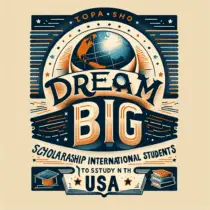Applying for a scholarship to study in the United States is a dream for many students worldwide. The allure of world-class education, diverse cultural experiences, and unparalleled opportunities draws thousands each year. However, amidst the excitement and planning, navigating visa requirements can seem daunting. This article aims to simplify the process and guide prospective students through the essential steps to securing a visa while applying for US scholarships.
Understanding the Basics
First and foremost, it is crucial to understand what a visa is and why it is necessary. A visa is an official endorsement on a passport indicating that the holder is allowed to enter, stay or leave a country for a specified period. For international students planning to study in the United States, obtaining the correct student visa is pivotal.
Types of Student Visas
The United States offers three primary types of student visas:
F-1 Visa (Academic Students):
- This visa type is issued to full-time students enrolled in an academic program or English language program.
- It allows students to stay in the United States for as long as they are enrolled in their academic program.
- Students may also work part-time on-campus.
J-1 Visa (Exchange Visitors):
- This visa type is often associated with exchange programs but can also be used by students receiving substantial funding from external sources like scholarships or government grants.
- J-1 visa holders are typically required to return to their home country for at least two years after their program ends before they can apply for certain types of US visas again.
M-1 Visa (Vocational Students):
- This visa type applies to students enrolling in non-academic or vocational studies.
- Unlike F-1 visas, M-1 visas have fixed timeframes and do not accommodate transferring between schools or extending stay beyond one year without reapplying.
Step-by-Step Guide: Obtaining a Student Visa
Step 1: Secure Admission and Obtain Form I-20 or DS-2019
Before applying for a student visa, candidates must first secure admission from an accredited US institution. Once accepted, the institution will provide either Form I-20 (for F-1 visas) or Form DS-2019 (for J-1 visas). These forms are crucial as they certify that you meet all requirements and have been accepted into a study program.
Step 2: Pay SEVIS Fee
The next step involves paying the SEVIS (Student and Exchange Visitor Information System) fee. This fee supports the automated system that tracks information about exchange visitors during their stay in the United States.
Step 3: Complete Online Form DS-160
Form DS-160 is an online nonimmigrant visa application form that all prospective international students must complete. The form requires detailed personal information including passport details, travel plans, health history, and educational background.
Step 4: Schedule Visa Interview
After submitting Form DS-160, applicants must schedule an interview at the nearest US Embassy or Consulate. It’s imperative to plan this step well ahead due to potential wait times which vary by location and season.
Step 5: Prepare Documents for Interview
The interview process necessitates thorough preparation with essential documents including:
- A valid passport
- Confirmation page of Form DS-160
- Receipt proving payment of SEVIS fee
- Form I-20 or DS-2019 from your institution
- Financial evidence showing sufficient funds
- Academic transcripts and standardized test scores
- Scholarship award letters if applicable
- Photographs meeting US passport specifications
Step 6: Attend Visa Interview
During the interview at your designated embassy or consulate office, answer questions honestly about your educational plans, financial status, previous travel history if any among other relevant topics related specifically towards your intent behind studying within U.S borders . Be prepared also present additional documentation supporting these answers when requested so proves helpful throughout this phase overall .
Tips for Success
Navigating through myriad requirements might feel overwhelming initially but breaking down tasks into manageable steps certainly helps alleviate stress considerably:
Start Early : Given fluctuating timelines processes involve starting early ensures ample time address unexpected delays especially when dealing bureaucracy .
Stay Organized : Keeping track important deadlines documents simplifies process avoids last-minute scrambles .
Be Honest & Transparent During Interviews : Consular officers highly trained detect inconsistencies therefore honesty remains best policy always .
Seek Guidance From Experts When Needed : Many institutions offer international student offices dedicated professionals assisting throughout journey utilize resources maximize chances success .
Conclusion
Embarking upon journey pursue higher education abroad indeed exciting venture yet challenges arise particularly around obtaining necessary visas however adopting structured approach combined thorough preparation makes entire process manageable ultimately rewarding experience lifetime . So take leap faith , follow outlined steps above secure path towards achieving academic dreams amidst vibrant diverse culture waiting explore firsthand !






